Brazilian filmmakers Diana Boccara and Leo Longo talk about their project to present the first global series on music videos and their latest stop in Cairo to shoot Cairokee's El-Khatt Dah Khatty.
By Noha Mohammed Photos courtesy of ATW80
Diana Boccara is a screenwriter, producer and content writer for TV reality-shows such as the Brazilian version of The Apprentice, The Farm and Amazing Race, along with commercials, documentaries and web content. Leo Longo is a filmmaker and director for broadcast TV, commercials and music videos, directing big-hit online films with over 8 million views. Together the Brazilian couple have embarked on a world tour to shoot 80 music videos in over 20 different countries. In an exclusive interview with Egypt Today, Boccara, whose father was born in Cairo, talks about the pair’s recent trip to shoot a video with Cairokee in October.
Who are Diana Boccara and Leo Longo?
Leo and I are a couple. He was born in a city called Piracicaba, two hours away from São Paulo, the same city we shot our first music video for the Brazilian band “Vanguart.” I’m from São Paulo, born and raised there. We have the same major in communications and since college, both of us have been working with media, television and content production. I’m a TV producer and screenwriter in Brazil. I’ve worked for several networks and production companies there, especially in reality shows. Leo is a TV director who has also worked in broadcast TV for over 15 years, directing shows for MTV, History Channel, NatGeo, Globo, Record and others. We are really passionate about what we do and that is why our project is actually a reality in our lives and not only another dream. It took us one year to get it together, plan all the details and finally start it.
[caption id="attachment_384259" align="alignnone" width="620"]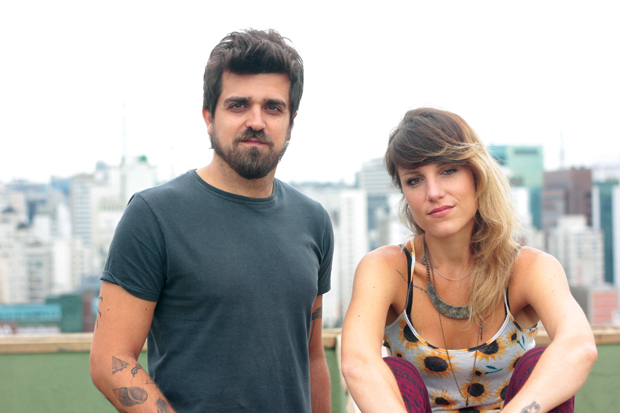 Leo Longo and Diana Boccara, the couple behind the ATW80 project.[/caption]
Leo Longo and Diana Boccara, the couple behind the ATW80 project.[/caption]
This is a really interesting project. What made you think of traveling the world and shooting 80 videos?
We’ve always wanted to work on a project of our own. After a road trip we did in the south of the USA last year, visiting Nashville, Memphis, Clarksdale and New Orleans, Leo and I came back with the desire to keep travelling and to work with music. We ended up combining our expertise in filmmaking with travelling and music and that led us to the perfect final visual material, the music video. We also wanted to establish a new way to work that would not involve any currency exchange, just collaboration between artists and filmmakers around the world.
That’s the short story on how we created the first global series on music video of the web. Every Monday, for 80 weeks, we launch a new and official music video by different artists from one of the places we traveled to. We invite artists and bands that play rock music (or subgenres of rock) that we identify with, that we admire and that use the web as a platform to promote their work. We invite them to participate in the project with us and work on a new music video shot with the project.
How do you manage to make a video every week?
All the music videos we make are shot in a onesequence shot, with no cuts. Because of that, we have to be very creative with all the stories for the music videos. Every new song we make a music video for is a new challenge for us, especially since we don’t know the places that we travel to and most of the time we do it all just the two of us.
For every music video, we also shoot the making of it for a weekly episode of our Behind the Trip! where we show our works, our life, the places that we visit, our challenges to shoot a music video in one take and the relationships we develop along the way.
We started the project in Brazil in March of this year, where we did 10 music videos with Brazilian bands. Then, we went to Portugal, France, Switzerland, Italy, Germany, England, Scotland, Ireland, Egypt and now Russia. Next we will go to India, Hong Kong, South Korea, the Philippines, Australia, New Zealand, USA, Mexico and South America. Our plan is to finish the trip and the shooting of the videos in September of 2016. So, we still have a long way to go.
[caption id="attachment_384251" align="alignnone" width="620"]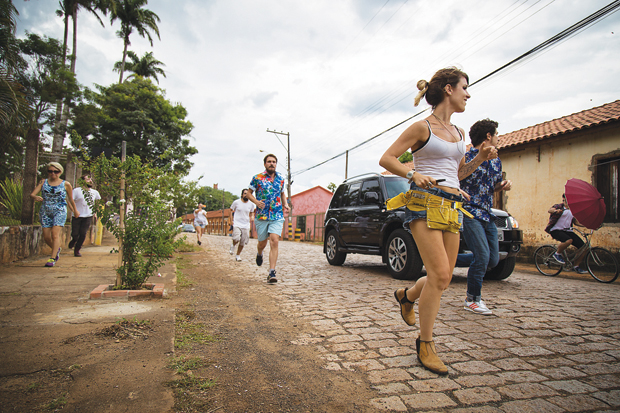 ATW80's first music video was shot in Piracicaba, Brazil, with the band Vanguart.[/caption]
ATW80's first music video was shot in Piracicaba, Brazil, with the band Vanguart.[/caption]
Other than Leo and yourself, how many others are part of the team?
None actually. Leo and I do everything, from the beginning to the end of every music video. We contact the bands, we develop the ideas along with them, we produce, we shoot the music videos and making-ofs and edit it all. But everywhere we go, we look for other filmmakers and production companies that would like to join us and be a part of the project with us, helping us find locations, actors and equipment.
Who’s funding this project?
We created this project with the intent of doing something new, unique and global. For that, we sold everything we owned in Brazil to help to pay for 18 months for the two of us to travel around the world. But we still don’t have enough money to complete the trip because we basically have to cover food, accommodation and travelling. In Brazil, we had HP, Adidas and Smirnoff as partners for the Brazilian part of the project. We also had the support of Swiss International Air Lines from May until the end of this month, who provided us with tickets to travel around Europe, to Egypt, Russia and India. Premium Assistance Brasil is also our partner, helping us out with our insurance during one year of our 18-month trip. But we are now looking for partners that could join the project on our next trips to Asia, Australia, USA, Mexico and South America.
Unfortunately, people put money first and let the dreams come later on. Or maybe believe that for dreams to happen, you need just money. We are living proof that we do need money to accomplish this project, since we do have to eat, sleep and travel. But we can live without luxuries, without buying clothes, with only two suitcases each, with a daily budget to follow, saving money and using all the creativity we have to come up with great ideas for videos shot with very little or no money. And in the end, when we come back to Brazil, we won’t have money, we won’t have a house, a car. We will only have what we carry in our suitcase. But we will have completed the first global series on music videos, we will have an amazing network of friend, artists and filmmakers all over the world and priceless adventures to tell.
How difficult has it been making your dream project come true?
It was not an easy job to make it happen. We gave up our jobs to focus only on the project. And for several months, our friends and some family didn’t believe in us, in our project and in our goals. We spent six months trying to find partners to sponsor the project while we were planning. They also didn’t believe two people could put together such a big project. No one believed we would have bands accepting our invitations. It was only after we started it, in the beginning of 2015, that brands put faith in us.
What are you expecting to achieve with the 80 videos?
ATW80 is an independent and collaborative project that seeks to rethink the relationship between music and filmmaking, throughout the world. We are also building a collaborative network of artists, musicians and filmmakers around the world, bringing different cultures together through music and film, besides exploring the world not as tourists, but as locals. We have no idea what will come after 18 months travelling around the world, meeting the most amazing people all over, and collaborating with great artists and bands to do each of the music videos. But we are sure it will be a positive result for everyone involved.
[caption id="attachment_384253" align="alignnone" width="620"]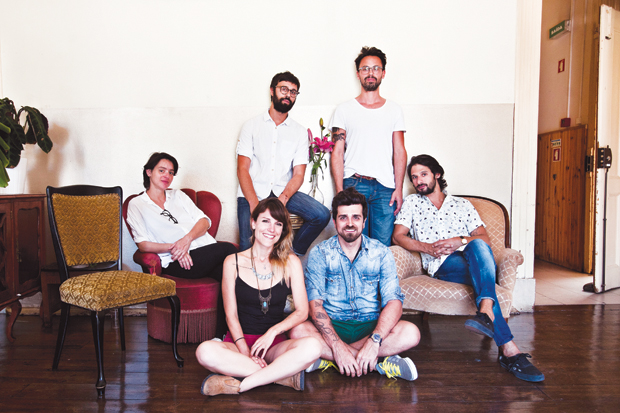 Boccara and Longo with the Portuguese band Linda Martina after a shoot in Lisbon.[/caption]
Boccara and Longo with the Portuguese band Linda Martina after a shoot in Lisbon.[/caption]
Do you believe that a global project like this can really help in bringing cultures closer together and destroy stereotypes?
Music is a beautiful and simple way to bring people together, to send a message and to entertain people all over the world. And we see this happening every day with ATW80; people are so used to hearing what they are used to or what they end up hearing on the radio, watching on the TV — mostly more commercial and global music from countries like the USA, the UK, Canada, and Australia. Not many people have the time to research the musical scene in different countries.
We bring to the project bands and artists we really enjoy from the countries that we are visiting. And every single week, we get messages on our page on Facebook, thanking us for introducing a new and cool band to the playlist. So yes, we really believe that music, specially now with the web, can bring cultures together. Also, because of the web we are so much “closer” to the musicians and we not only get to hear the music, but also to experience their cultures via their pages on Facebook. It is because of the web that our project is possible.
What’s it like experiencing different music scenes?
With ATW80, we are exploring the rock scene in every country we go and demystifying so many stereotypes in the process. Like in Egypt. We don’t speak Arabic, but when we heard El Khat Dah Khatty (This Handwriting is Mine), we felt it was a very strong song, with a lot of power in the melody and in the message. We had no ideas what it was about, but we felt it. After getting to know Cairokee and going over the story behind the song, the feelings we had made sense. We connected to the song, even though we don’t speak the language. And that is what music is about.
How long are you typically in any one destination? Does it give you enough of a chance to experience the culture of the people and get to know the destination?
We normally spend from two to four weeks in every country. Since it’s only the two of us doing everything, we end up most of the time at home, editing, writing, researching. We don’t really have days off, and that is a pity because we don’t get to really see the cities we go to. On the other hand, what we do see is always in the company of the artists or bands that we collaborate with, or friends we end up making on every shoot. We experience the cities through the eyes of the locals, and that is so much better than to just follow a tour guide around.
[caption id="attachment_384257" align="alignnone" width="620"]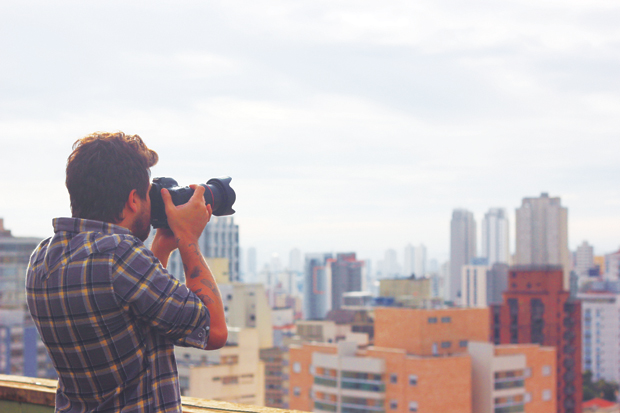 Longo taking photos in Sao Paulo, Brazil.[/caption]
Longo taking photos in Sao Paulo, Brazil.[/caption]
So much jetting must be exhausting.
It is a lot of work for two people and we get very tired for not having frequent days off, but we really love what we are doing and it fulfills us as human beings and professionals. Every day is a new challenge for us. A new band, a new country, new home, new language, new culture, new friends. There is not a dull day for us in ATW80, and that makes it all worthwhile. But yes, we are really looking forward to taking some time off. Cairo was video number 29 on your list, what was working on the previous videos like?
In Cairo we shot music video number 29, but Egypt was country number 10 on our list. The first music video we shot, with the Brazilian band Vanguart, was a big challenge for us. The idea was very complex and it was our first shoot, so it was not easy. But when we got the perfect take, it was just amazing. And we had so much fun that the band, who was running for more than one hour in a street in Piracicaba, a city in the country side of São Paulo, just wanted to keep shooting more and more. The first music video we shot in Berlin, with Alin Coen Band, was another challenge. It was the first time we shot a music video in reverse and we had only one take to do it, because at the end of the shoot (the beginning of the video) we throw a lot of paint at Alin. So, it was impossible to reshoot it. But we managed to get it all right and it is an amazing video.
Which was your favorite video?
We fell in love with Portugal, I cannot deny that, and Lisbon is one of our favorite cities so far. But our time in Cairo was very special to me. My father was born in the city and I have been listening to his stories about his childhood in Egypt all my life. So, for us, it was a very important moment. I got the chance to eat real molokhia, a dish my grandmother used to prepare for us when I was young and that my family still makes to this day. Leo had tried it in my house in Brazil also, so he also was looking forward to this moment. And we had a great time with Cairokee and the challenges we had to produce a music video in a city where we knew no one.
[caption id="attachment_384252" align="alignnone" width="620"]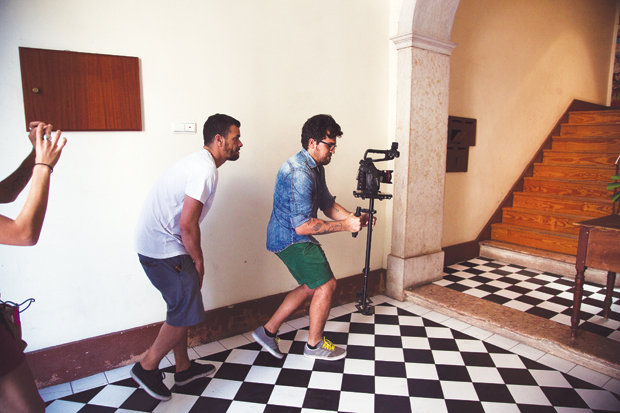 Longo and Filipe Correa dos Santos, a filmmaker who collaborated with ATW80 in Lisbon.[/caption]
Longo and Filipe Correa dos Santos, a filmmaker who collaborated with ATW80 in Lisbon.[/caption]
How do you hook up with bands across the globe?
We research a lot. Music blogs, local magazines, radio stations, music channels, concert lineups. We go over it all for each country. We then look for their contact on the web and invite them to join the project. We also research the neighborhoods and local culture before we arrive at the city we’re staying at. We spend most of the time at home, so the neighborhood we stay at is very important for us.
Is language ever a barrier? How about safety issues, especially that situations in many areas, not only in the Middle East, around the world are volatile?
English ends up being our official language everywhere we go. We have challenges, but we are always trying to overcome them. We try to learn basic words and sentences of every language, at least to communicate that we don’t speak the language and ask if the person speaks English. But it is also challenging to direct and produce the videos if bands don’t speak or understand English. The first time that this happened was in Russia. And that is why it is so important for us to have the collaboration of local filmmakers, to help out with this communication.
About safety, we always joke around saying that we are used to being careful about safety issues because we are from São Paulo, a very big city with traditional big city issues - robberies, traffic, poverty and so on.
[caption id="attachment_384254" align="alignnone" width="620"]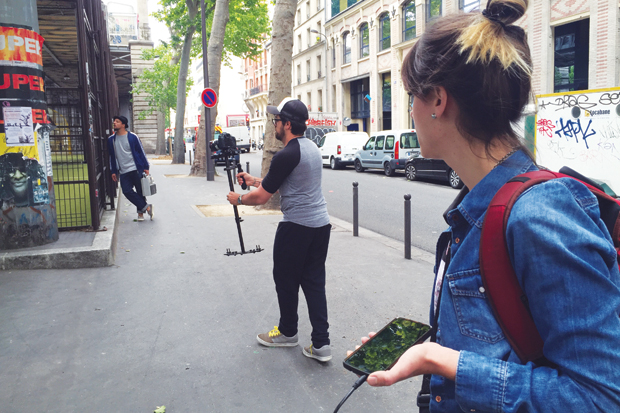 ATW80 shooting a music video in Paris with French artists Ben l'Oncle Soul.[/caption]
ATW80 shooting a music video in Paris with French artists Ben l'Oncle Soul.[/caption]
Were you worried at all about coming to Egypt?
I wouldn’t say that we were worried, but I would say we were very curious about the country and Cairo. It was our first and only experience in the Middle East so far, and it was amazing. We felt that Egyptians are very similar to Brazilians in many ways and after a couple of days trying to figure out the culture and the people, we actually felt at home, like we hadn’t in a very long time.
What was your favorite part of the Cairo trip? You visited the pyramids, got stuck in traffic and ate molokhia. What was all that like for you?
Well, I have to say that the pyramids was a visit to remember forever. It was unbelievable! molokhia was definitely number two. But I think that our time with Cairokee was really special and we had a great time with all of them. We loved living in Cairo. It’s a chaotic city, like São Paulo, just a bit messier than our home in Brazil. But we will remember Egypt as the country with welcoming people and amazing food!
From what you knew of Egypt from the media, did it turn out to be what you expected?
When we told friends and family we were going to Cairo, most of them were afraid something bad would happen to us and that is for sure because of the media and stereotypes. Bad things happen everywhere. Big cities are dangerous, each of them in their own way. We get asked a lot about how dangerous Brazil is, and if it is safe to go there. Of course it is safe and of course it is not. It depends on what you’ll do, where you’ll go, how much you will spend. If you research São Paulo, you’d be afraid of going there too. There is always bad things in the media about just about everything. But you’ll only know the truth if you see it and live it with your own eyes. So, I do hope our project can make a difference and show a bit of the world we live in while we visit every city.
[caption id="attachment_384250" align="alignnone" width="620"] In Piracicaba, Longo and Boccara get ready to shoot Vanguart's music video.[/caption]
In Piracicaba, Longo and Boccara get ready to shoot Vanguart's music video.[/caption]
What was the thing that surprised you most about Cairo?
We were surprised with how welcoming people were in Cairo. With everyone we talked to, asked for help, had contact with. They all were so nice and tried so hard to help us out. A very simple example was our story with the location where we shot Cairokee’s music video. A guy, Mahmoud Khattab, that had never seen us before, opened his house for us to shoot the music video without even knowing who we were working with. He had no idea it was going to be Cairokee until we actually got to his apartment, saw the building and decided it was the perfect place. That is the best example. He really wanted to help us out. And he really did.
Why did you choose Cairokee? Do you feel that this act and their sound are representative of Egyptian music?
Leo fell in love with their music the first time he heard it. He wrote to them as a fan of the music, not inviting them to be on the project (we never thought such a big band would say yes to our project). Next thing, the manager tells us to write to them about the project because they liked the idea.
Tell us about your experience working with Cairokee and what it taught you about Cairo and about Egyptians.
They were so easy to work with. We created three ideas for the music video and they really liked them. But since they had never done a thriller before, it was a new and exciting challenge for all of them, and for us as well! So, we all agreed that the chase in the building would be an interesting story that fit the main idea of the song. They are amazing guys, extremely focused and talented. All of them, including their manager, who became our friend and official tour guide in Cairo.
Cairokee are the biggest and most popular band we have worked with so far. And probably the most humble and simple guys we’ve met. Their life is their music. That’s who they are and what they believe in. It is beautiful to see that and you can feel it from their powerful songs. Working with them made us fall in love even more with the culture, the traditions and the country.
[caption id="attachment_384255" align="alignnone" width="620"]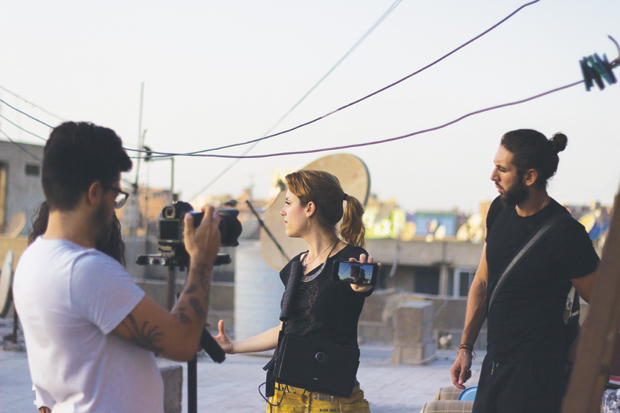 Shooting the Cairokee video (photo by @somewhereincairo)[/caption]
Shooting the Cairokee video (photo by @somewhereincairo)[/caption]
Did you think that the chosen song, “El Khatt Dah Khatty,” conveys the message you wanted to send with your Cairo installment of the project?
I believe both the song and the video have a very powerful message, each in a different way. Together, they became a perfect marriage. The way we see it, and that’s the idea behind the music video, musicians don’t write for themselves. They make music to share their ideas with others, their message, their thoughts. And the idea of the message being stronger than the messenger is very intense and powerful.
From what you know of Cairo’s music scene and its performers, what role do you feel music has to play in the country?
During our research and our time in Cairo, we were amazed to find so many different types of music and musicians: rock, instrumental, rap, hiphop, pop, and what is great is that there is always something unique about the Egyptian acts, because many of them really manage to include local and traditional instruments and sounds to current ballads and tunes. And this is what makes the musical scene so interesting. But what we felt is that music, as we said before, has a very important social role in the country. It’s a way musicians express their feelings toward what they believe and what they don’t. And their audience gets the message and helps spread it. Music, no matter what the genre, unites the people, especially if there is socially conscious content in it. And we could feel all of that while we were in Cairo.
[caption id="attachment_384258" align="alignnone" width="620"] Diana Boccara and Leo Longo.[/caption]
Diana Boccara and Leo Longo.[/caption]
What’s next for you and Leo, after this project ends?
We have some ideas to keep working with music and filmmaking, in a collaborative way like we are now. It’s amazing to see that the world is full of people that are just looking for a good reason to collaborate, or an opportunity. Yes, we all have bills to pay, but to do what you love is really priceless.
Comments
Leave a Comment